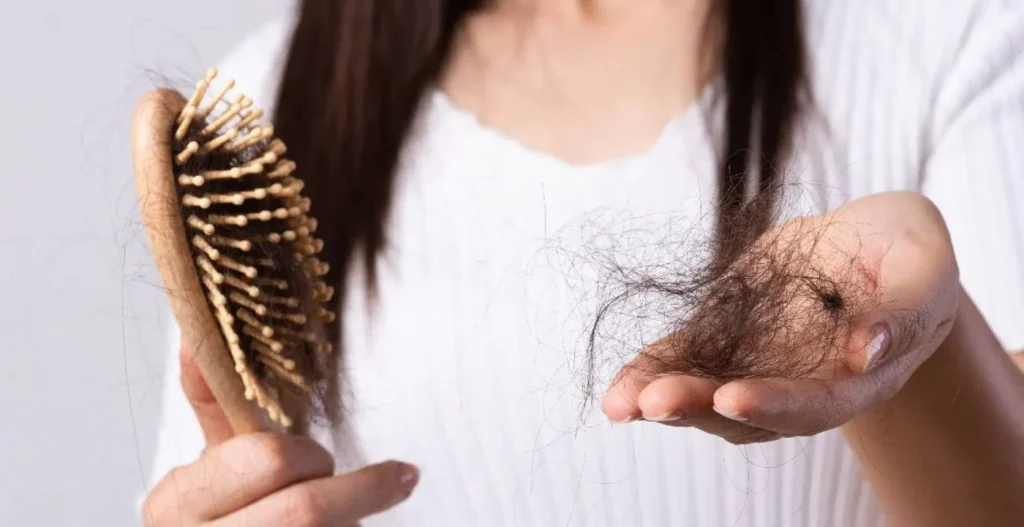Are you experiencing hair loss and wondering if gluten sensitivity could be the cause? Many people with gluten sensitivity or celiac disease struggle with unexplained hair thinning. This article will explore the connection between gluten sensitivity and hair loss, how it affects your hair health, and what steps you can take to manage both conditions. …
Are you experiencing hair loss and wondering if gluten sensitivity could be the cause? Many people with gluten sensitivity or celiac disease struggle with unexplained hair thinning.
This article will explore the connection between gluten sensitivity and hair loss, how it affects your hair health, and what steps you can take to manage both conditions. By understanding this link, you can take better care of your hair and overall health. Let’s dive into the science and solutions behind gluten sensitivity and hair loss.

What is Gluten Sensitivity?
Defining Gluten Sensitivity vs. Celiac Disease
Gluten sensitivity refers to a condition in which a person experiences discomfort or symptoms when consuming gluten, a protein found in wheat, barley, and rye. Unlike celiac disease, which is an autoimmune disorder, gluten sensitivity does not damage the intestines but can lead to symptoms like bloating, fatigue, and joint pain. Celiac disease, on the other hand, causes long-term damage to the small intestine and can lead to nutrient deficiencies that may exacerbate hair loss.
How Gluten Affects the Digestive System and Overall Health
When a person with gluten sensitivity consumes gluten, it can cause inflammation in the gut, impair nutrient absorption, and lead to various symptoms. As the digestive system struggles to process gluten, it can affect other parts of the body, including hair follicles. According to experts, nutrient deficiencies caused by gluten sensitivity can result in poor hair health, ultimately contributing to hair thinning or loss.
How Gluten Sensitivity Leads to Hair Loss
The Role of Inflammation in Hair Thinning
Chronic inflammation caused by gluten sensitivity can severely affect hair follicles, making it harder for hair to grow or stay healthy. Inflammation prevents essential nutrients from reaching the hair follicles, hindering their ability to support robust hair growth. Over time, this can cause the hair to become weaker and thinner, leading to noticeable hair loss.
Nutritional Deficiencies and Hair Loss
People with gluten sensitivity often experience deficiencies in crucial nutrients such as iron, zinc, and biotin, all of which are necessary for healthy hair growth. These deficiencies occur because the gut struggles to absorb nutrients properly when gluten is consumed. Without these vital nutrients, hair growth slows, and existing strands become more fragile.
Stress and Hair Loss: A Vicious Cycle
Gluten sensitivity can also cause physical and emotional stress, which further exacerbates hair loss. Stress activates the hormone cortisol, which has been linked to telogen effluvium, a condition where hair enters the shedding phase prematurely. The anxiety and discomfort caused by gluten sensitivity can worsen hair loss, creating a vicious cycle. Managing stress through lifestyle changes can significantly improve hair health and overall well-being.
Managing Gluten Sensitivity to Prevent Hair Loss
Adopting a Gluten-Free Diet
The most effective way to manage gluten sensitivity and its effects on hair loss is by adopting a strict gluten-free diet. This dietary change helps reduce inflammation in the gut and allows the body to absorb essential nutrients more efficiently. A gluten-free diet can also alleviate the physical and emotional stress associated with gluten sensitivity, leading to healthier hair growth.
If you’re new to a gluten-free lifestyle, consider working with a nutritionist or dietitian to ensure you’re getting a balanced intake of necessary nutrients while avoiding gluten.
Supplementing Nutrients for Hair Growth
To combat the nutritional deficiencies often caused by gluten sensitivity, incorporating supplements into your diet can help restore hair health. Iron, vitamin D, biotin, and zinc are all crucial for hair growth. These nutrients support healthy hair follicles, reduce hair thinning, and promote regrowth. Consult a healthcare provider before starting any new supplement to ensure you’re meeting your specific needs.
Managing Stress to Protect Hair Health
Since stress is a major contributor to hair loss, managing it is vital for maintaining healthy hair. Techniques such as mindfulness meditation, yoga, and deep breathing exercises can help reduce the physical and emotional stress caused by gluten sensitivity. Implementing these practices daily can help balance stress levels and improve hair growth over time.
Is Gluten Sensitivity the Sole Cause of Hair Loss?

Other Potential Causes of Hair Loss
While gluten sensitivity can contribute to hair loss, it’s not the only potential cause. Genetics, hormonal imbalances, thyroid disorders, and autoimmune conditions can all play a role in hair thinning. If you’re experiencing hair loss, it’s essential to consider these factors and seek professional medical advice for a comprehensive diagnosis.
How to Distinguish Gluten Sensitivity from Other Conditions
If you suspect gluten sensitivity is causing your hair loss, consulting with a doctor can help rule out other conditions. Medical tests, including blood tests and skin biopsies, can help determine whether gluten sensitivity or other factors are responsible for your hair issues. If gluten sensitivity is confirmed, transitioning to a gluten-free diet can help restore hair health.
Expert Opinions on Gluten Sensitivity and Hair Loss
Case Studies or Patient Experiences
Case studies show that individuals who eliminate gluten from their diet often experience significant improvements in hair density and overall scalp health. Many patients report noticeable hair regrowth within months of adhering to a gluten-free diet and supplementing necessary nutrients.
FAQs
Can Going Gluten-Free Improve My Hair Health?
Yes, adopting a gluten-free diet can help reduce inflammation, improve nutrient absorption, and promote healthier hair growth in people with gluten sensitivity.
How Long Does It Take for Hair to Regrow After Eliminating Gluten?
Hair regrowth varies from person to person, but many individuals notice improvements in hair health within 3 to 6 months of eliminating gluten and addressing nutrient deficiencies.
What If Gluten Sensitivity Isn’t the Cause of My Hair Loss?
If gluten sensitivity is ruled out, your doctor may recommend testing for other conditions such as thyroid disorders or androgenic alopecia to determine the underlying cause of your hair loss.
Conclusison
When to See a Doctor or Hair Specialist
If you suspect gluten sensitivity is causing hair loss, or if your hair loss is persistent, it’s important to consult a healthcare provider. A dermatologist or nutritionist can guide you through treatment options and help you develop a plan for better hair health.
Gluten-Free Meal Plan Ideas for Better Hair Health
Incorporating nutrient-rich, gluten-free foods into your diet can help support healthy hair growth. Consider adding leafy greens, lean proteins, quinoa, and gluten-free oats to your meals to provide essential vitamins and minerals for hair health.
Ready To Take Your Next step
Consult with a Specialist Today
If you’re concerned about gluten sensitivity and hair loss, book a consultation with Dr. Uzma Irfan today. Learn more about how a gluten-free diet can improve your hair health and overall well-being. Take control of your hair health and start your journey to a fuller, healthier scalp today.






